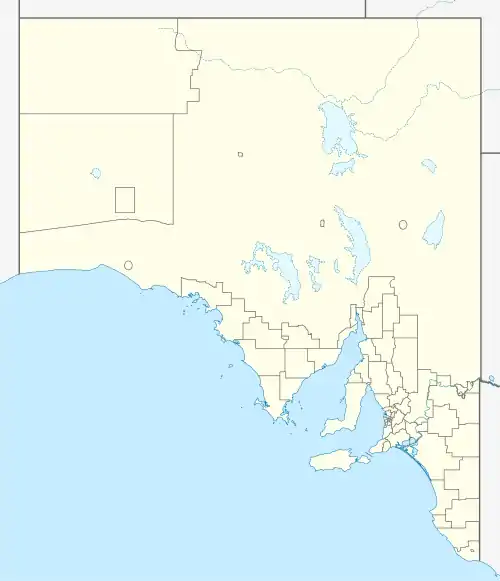| Nyapaṟi South Australia | |||||||||
|---|---|---|---|---|---|---|---|---|---|
 Nyapaṟi | |||||||||
| Coordinates | 26°10′36″S 130°13′14″E / 26.17667°S 130.22056°E | ||||||||
| Population | 85 (2011 census)[1] | ||||||||
| Established | mid-1970s | ||||||||
| Postcode(s) | 5710 | ||||||||
| Elevation | 668 m (2,192 ft) | ||||||||
| Location |
| ||||||||
| LGA(s) | Aṉangu Pitjantjatjara Yankunytjatjara | ||||||||
| State electorate(s) | Giles | ||||||||
| Federal division(s) | Grey | ||||||||
| |||||||||
Nyapaṟi is an Aboriginal community in the Aṉangu Pitjantjatjara Yankunytjatjara Lands in South Australia. It is located about 20 km (12 mi) south of the Northern Territory border at the base of the Mann Ranges. The nearby community of Kanpi is 15 km (9.3 mi) to the west.
There are about 50-100 people living there, including a small number of piranpa (non-Aboriginal) people. The residents are mostly Pitjantjatjara people. Nyapaṟi began as a family outstation by the Stevens family, who moved here to look after the country of their ancestors. Today it is a fully established community of extended families.[2] It serves as an administration centre for nearby outstations Ulkiya and Tankannu.
Because both Nyapaṟi and nearby Kaṉpi are small communities, there are only basic services and most of them are shared between the two towns. In Nyapaṟi, there is an art centre and a health clinic. Supplies are delivered once every two weeks, and mail is delivered once per week. The community store is in Kaṉpi.[3]
Both Kaṉpi and Nyapaṟi had their own schools from 1987, but these merged in 1993. The new school, Murputja Education Centre, was built between the two communities, 6 km (3.7 mi) east of Nyapaṟi and 9 kilometres (5.6 mi) west of Kaṉpi.[4]
The Tjungu Palya art centre at Nyapari supports the development of a number of artists,[5] some of whom have had work exhibited in Darwin, Singapore, Alice Springs, Melbourne and Switzerland, as well as in Tarnanthi at the Art Gallery of South Australia in Adelaide in 2017.[6] The centre is one of ten Indigenous-owned and -governed enterprises that go to make up the APY Art Centre Collective,[7] established in 2013.[8]
Time zone
Due to its links with the Northern Territory and proximity to the border, the APY Lands do not observe daylight savings unlike the rest of South Australia. The time zone observed throughout the year is Australian Central Standard Time (UTC+9:30), in line with Darwin rather than Adelaide.
References
- ↑ Australian Bureau of Statistics (31 October 2012). "Kanpi – Nyapari – Angatja". 2011 Census QuickStats. Retrieved 8 January 2014.
- ↑ "Nyapari". APY Communities. Anangu Pitjantjatjara Yankunytjatjara. Retrieved 16 March 2020.
- ↑ "Nyapari". Waru. Retrieved 28 October 2012.
- ↑ "Murputja School". Waru. Archived from the original on 14 October 2012. Retrieved 28 October 2012.
- ↑ "About". Tjungu Palya. Retrieved 16 March 2020.
- ↑ "Archive". Tjungu Palya. Retrieved 16 March 2020.
- ↑ "Our Art Centres". APY Art Centre Collective. Retrieved 16 March 2020.
- ↑ Marsh, Walter (20 May 2019). "New gallery run for and by Anangu artists opens in Adelaide". The Adelaide Review. Retrieved 15 March 2020.